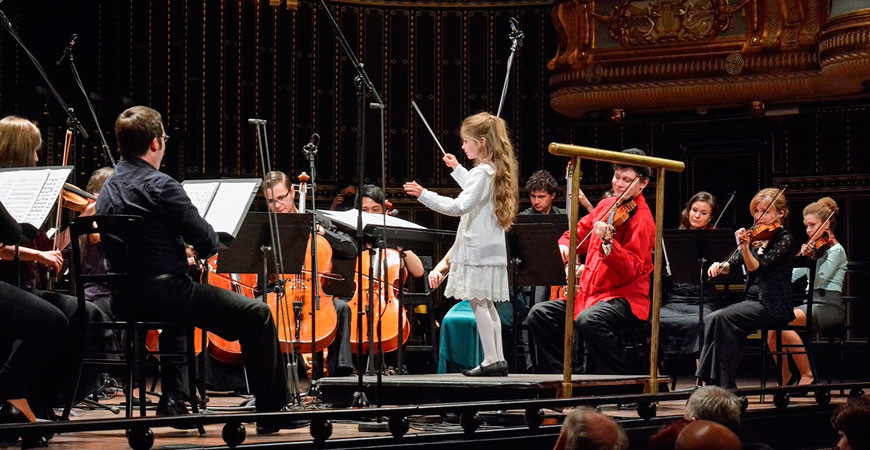
2018. március 25. 11.00-13.00
Liszt Kidz Academy
The Superfluous Conductor  A Zeneakadémia saját szervezésű programja
A Zeneakadémia saját szervezésű programja
For 10-15-year-olds
Mozart
40. (g-moll) szimfónia, K. 550 – 1. tétel
Mendelssohn
42. zsoltár, op. 42 – Meine Seele dürstet nach Gott (ária); Meine Thränen sind meine Speise Tag und Nacht (recitativo); Denn ich wollte gern hingehen (ária)
Beethoven
5. (c-moll) szimfónia, op. 67 („Sors”) - 1. tétel
Haydn
88. (G-dúr) szimfónia - 4. tétel
-;-Bojtos Luca (szoprán); Pintér Gábor (színművész)
Angelica Leánykar (karnagy: Gráf Zsuzsanna)
Divisi Kamarazenekar
Mesél és vezényel: Dinya Dávid
40. (g-moll) szimfónia, K. 550 – 1. tétel
Mendelssohn
42. zsoltár, op. 42 – Meine Seele dürstet nach Gott (ária); Meine Thränen sind meine Speise Tag und Nacht (recitativo); Denn ich wollte gern hingehen (ária)
Beethoven
5. (c-moll) szimfónia, op. 67 („Sors”) - 1. tétel
Haydn
88. (G-dúr) szimfónia - 4. tétel
-;-Bojtos Luca (szoprán); Pintér Gábor (színművész)
Angelica Leánykar (karnagy: Gráf Zsuzsanna)
Divisi Kamarazenekar
Mesél és vezényel: Dinya Dávid
What is a viola doing in the orchestra if it rarely gets a melody and it does not play the bass part either? Why is a conductor needed when sometimes the orchestra gets along fine without him or her? What do opera directors do and would they be missed by the singers and audience if they were not there? What is the role of the score in classical music when many music cultures (folk music, jazz, Gregorian etc.) managed and still manage without it? These are the questions tackled by the Liszt Academy’s series for younger audiences; for the third time, Divisi Chamber Orchestra and Dávid Dinya, doctoral student at the Liszt Academy, guide young people through the mysteries of the work of conductors. We learn about the sort of problems that arise in a rehearsal, what the baton is used for, how an orchestra becomes a single instrument, why a conductor must have an insight into psychology, and how it is that a symphony orchestra cannot be operated along purely democratic lines. And at the end of the day the conclusion (naturally) is that the conductor is far from superfluous in classical music.
Jegyár:
HUF 1 400


